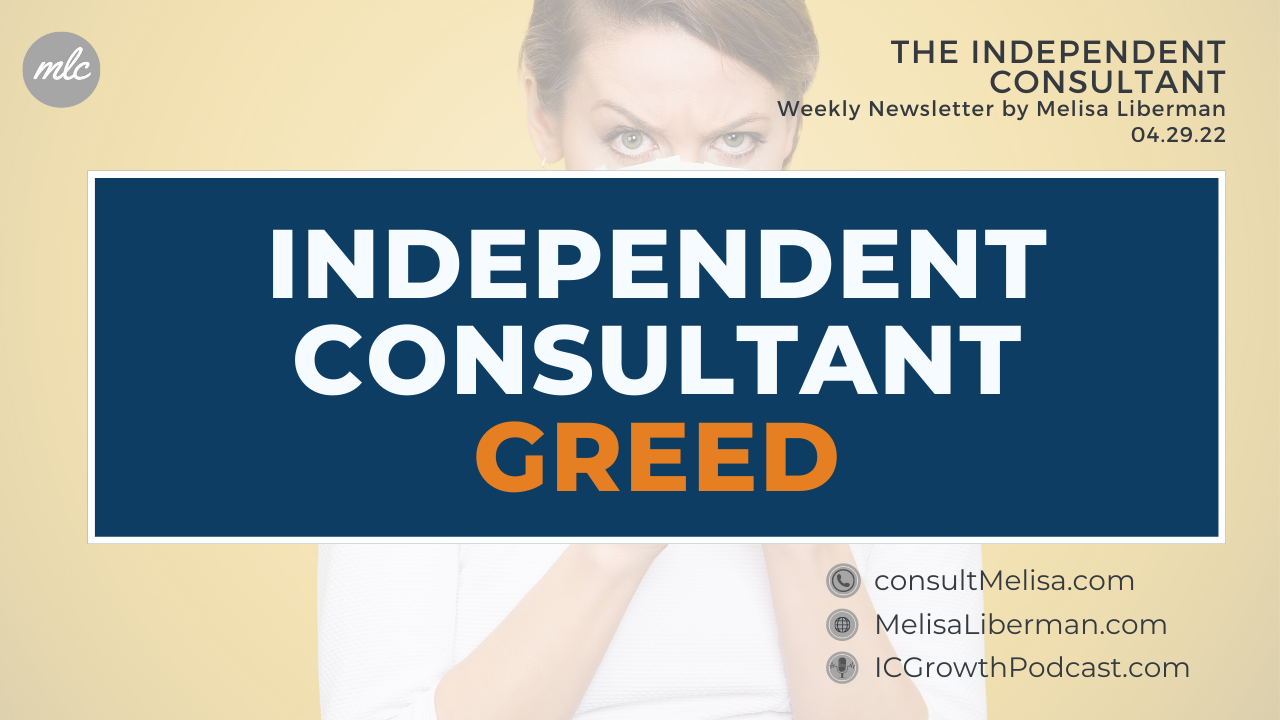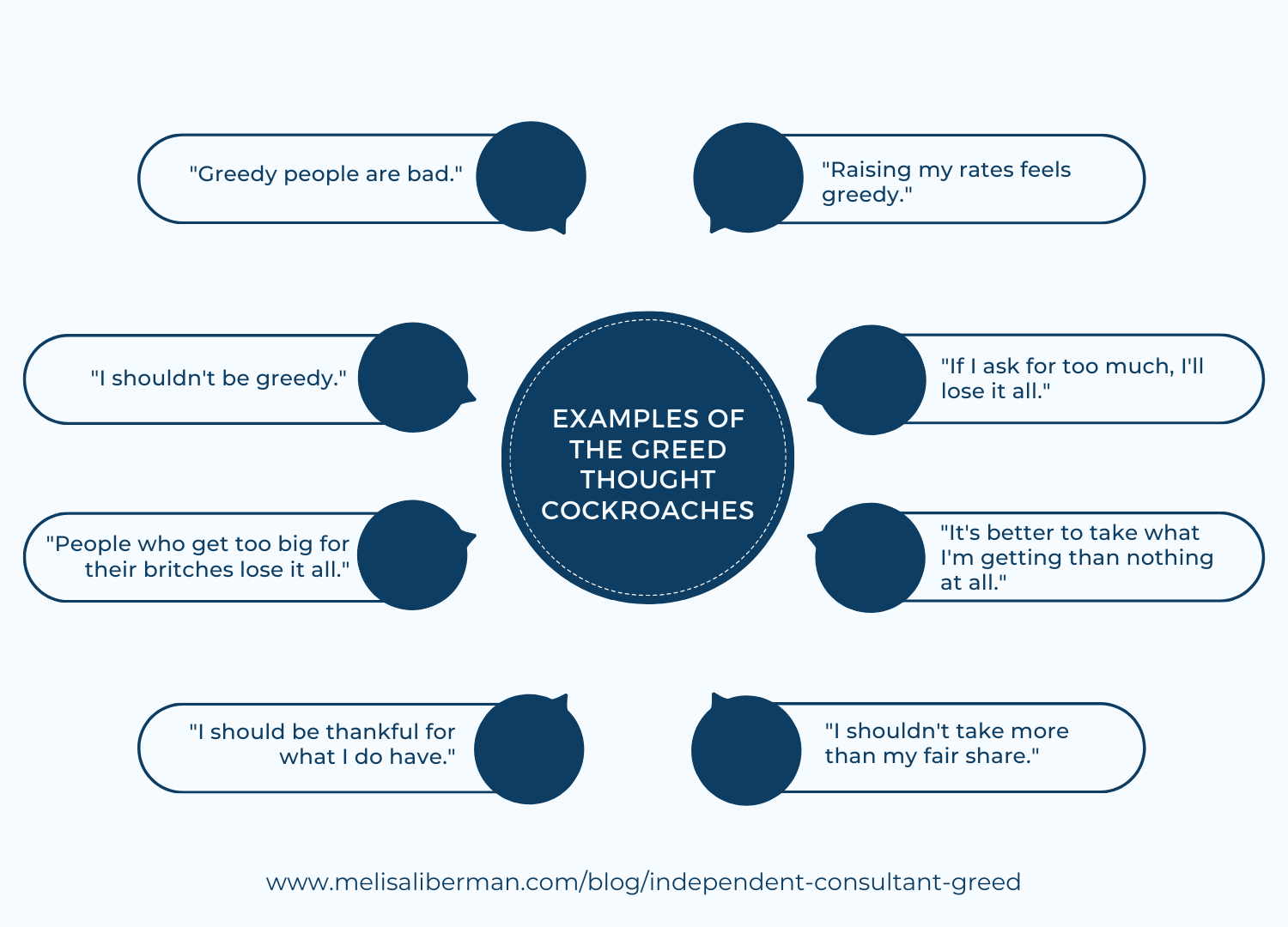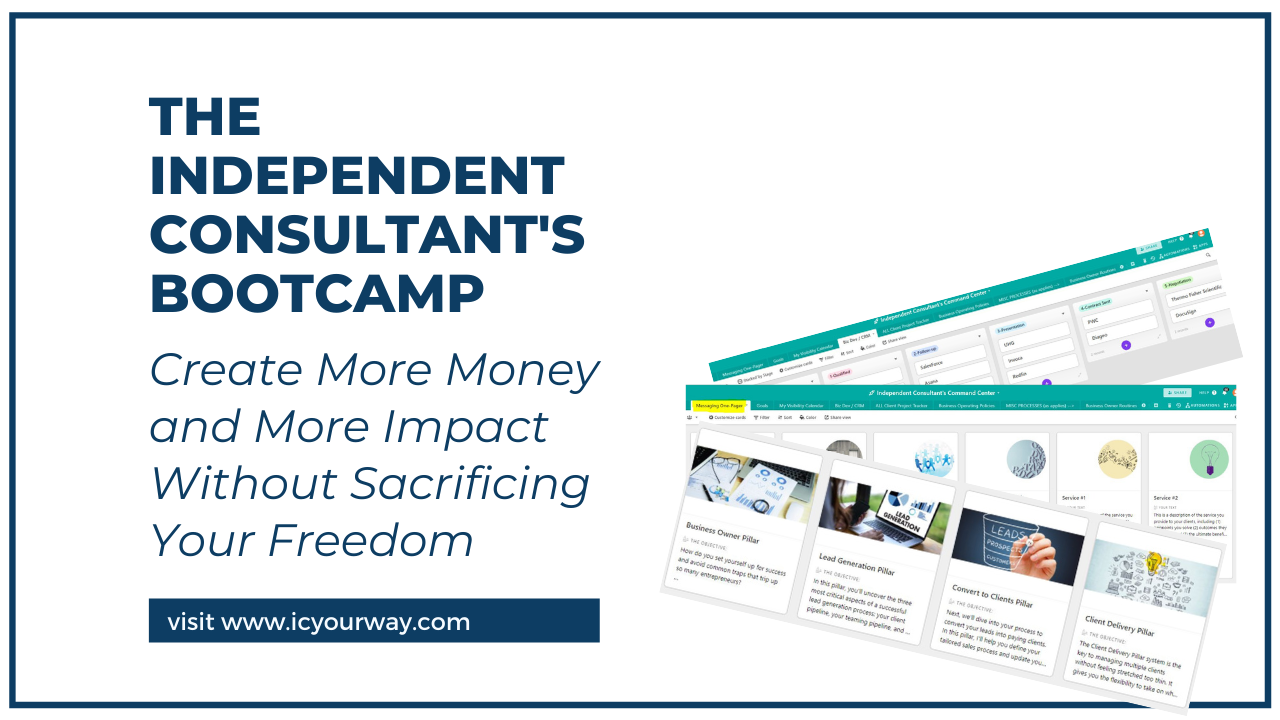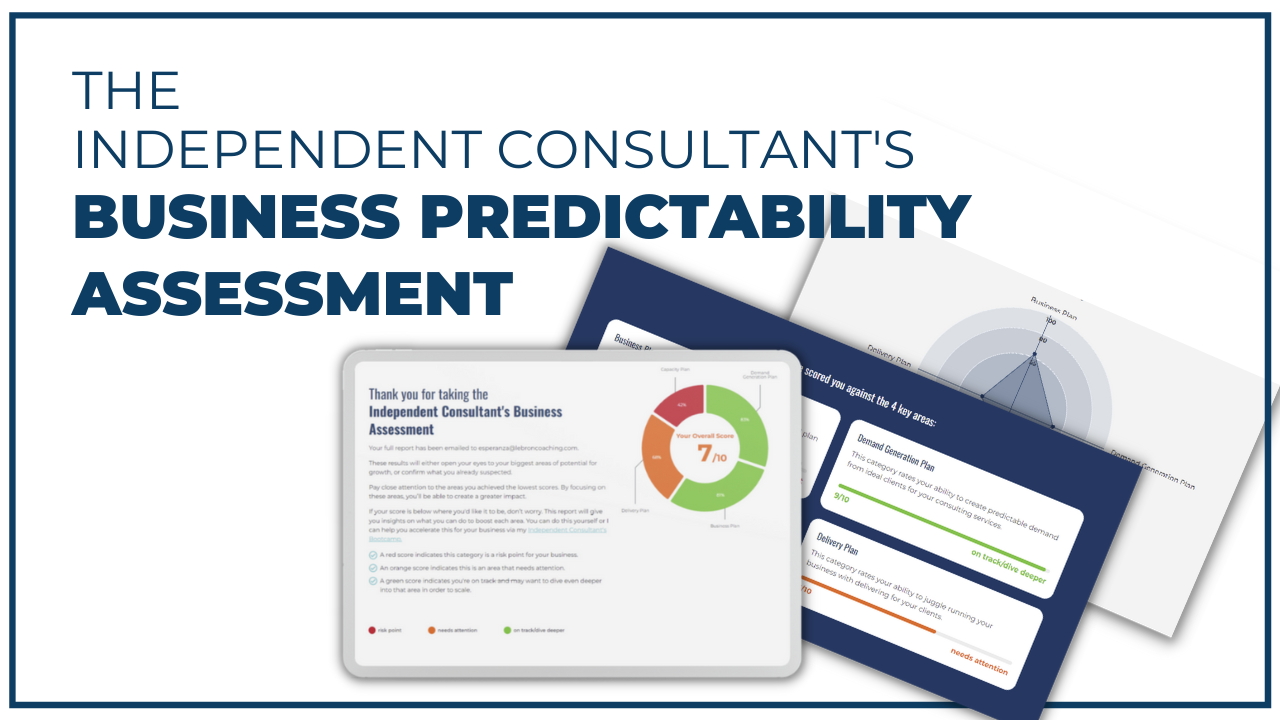Independent Consultant Greed
Apr 29, 2022
Estimated Reading Time: 19 minutes
Download the article as a PDF:

Introduction
You might be shocked by how your thoughts about greed are stifling your independent consulting business.
This comes up with my IC business owner clients ALL THE TIME.
In today's newsletter, we'll talk about:
- How to determine if your thoughts about greed could be hindering your IC business growth
- The overlooked impacts of your thoughts about greed on your business
- What to do about greed as an independent consulting business owner
Greedy Thinking

At first, you might think this topic doesn't apply to you.
That you aren't worried about being greedy.
Almost every independent consulting business owner I talk to doesn't realize that their beliefs about greed are lurking under the surface, let alone understand the impact these thoughts about greed are having on their business.
Logically, they tell me things like:
- I know what I do is valuable
- I’m great at helping my clients solve problems – to save money, to innovate, to become more efficient, etc.
But then as we dig into their offers, their value propositions, their pricing, their negotiating, and their follow-on proposals, we find what I call thought cockroaches.
Beliefs About Greed Are Thought Cockroaches
What are thought cockroaches?


- Subconscious thoughts that are mostly running the show (out of 6k thoughts per day, most are NOT on purpose)
- They are great at hiding
- They scurry when you shine a light on them
- They’re hard to kill
- You kill one, 10 more seem to replace them
Essentially, these thought cockroaches (in this case they're your belief system about greed) are under the surface and will have unseen impacts on your business unless you shine the light on them and replace them with higher-quality, business-owner level thinking.
Examples of the Greed Thought Cockroaches
What do these greed cockroaches sound like? It's this type of inner dialogue.
Any of these sound familiar?

- "Raising my rates feels greedy."
- "If I ask for too much, I'll lose it all."
- "It's better to take what I'm getting than nothing at all."
- "I shouldn't take more than my fair share."
- "I should be thankful for what I do have."
- "People who get too big for their britches lose it all."
- "I shouldn't be greedy."
- "Greedy people are bad."
These are the life lessons we're taught from an early age. And so we subconsciously take these belief systems into our consulting businesses and make decisions that help us to avoid end up any (perceived) appearance of being greedy.
We don't want to be “marked” as a bad people.
Greed Avoidance
With this, it's likely you're running your business from the place of not wanting to be greedy.
Almost every independent consulting business owner makes business decisions from greed avoidance.
So what?
What's the impact?
The Impact of Greed

At the end of the day, letting these belief systems about greed run your business results in
- Choosing what feels comfortable
- Not considering alternatives
- Dismissing anything related to negotiating
- Justifying the status quo
And ultimately, the impact on your independent consulting business is that you:
- Undercharge
- Underearn (which compounds year-over-year)
- Work more than necessary to make up for the difference
An Example - Extending Your Engagement
I was working with an IC Business Owner client of mine the other day and he shared that his consulting client wanted to extend the contract for 6 months.
My client (the IC Business Owner) was thrilled!
This gave him line of sight into revenue for the rest of this year and gave him more breathing room to continue working on pipeline development.
I asked, "what's your plan to negotiate your rates?"
He responded, "I'm happy to continue with the same rate structure, this is the industry standard."
I asked, "how is that not true?"
He was taken off guard for a minute.
I was challenging him, pushing him out of his comfort zone. He had already decided not to "rock the boat" and ask for more money.
As we dug in further to move past the logic of "this is industry standard," he started uncovering a myriad of ways that his rates
- were lower than industry standard (whatever that is) and
- how "industry standard" didn't really apply anyway.
As we peeled back the layers, we uncovered that at the heart of his decision to keep rates as-is was his belief that asking for more money would be greedy and that he should be grateful for what he already has.
These are thought patterns that he developed as a child. And, now that 4-year-old version of himself was running his business.
We questioned all of these thought processes that were underlying his decisions to raise his rates (or not).
Just because he was questioning the belief systems, didn't mean he had to raise his rates.
The coaching was about being fully transparent and honest with himself about what was driving his decision.
After he took away the layers of seemingly good logic (e.g. this is the industry standard), he was able to realize he was protecting himself from feeling greedy.
This is a common IC business owner's comfort zone, to avoid feeling greedy.
Through this, a light bulb went off for him. If he was selling these same services for his old employer, he wouldn't think twice about raising the rates because the value and the outcomes justified higher rates (and more).
But, it was because he had inserted himself into the equation, that he was thinking it was about him, that he was about to make the decision to avoid any appearance of being a greedy person.
And so, after he was in a position of being fully honest with himself about the drivers, he decided that he would propose a rate increase for this contract extension.
Put the "Independent Consultant's Greed" Topic Into Action
So, now that we've covered what is IC Greed, let's dig in more to see how it could be impacting you:
- Where are your own thoughts about greed and greedy people stifling your business growth?
- Where are you not being honest with yourself about your reasons for not negotiating?
- Where would you make different decisions about your pricing if you were selling work on behalf of someone else (versus for yourself)?
Find these areas and start tackling them, similar to the example process I described above.
And, for more help
And, if you'd like more help on this topic and re: running an independent consulting business, there are 2 resources for you:
1) The Bootcamp for Independent Consulting Business Owners

Most ICs lack the time and expertise to develop an effective business development process. In the IC Business Owner Bootcamp, I help you implement the 4 IC Growth Pillars so you generate predictable consulting revenue while working on your own terms.
2) The Independent Consultant's Business Predictability Assessment
Take this ~5-minute assessment. You'll receive a personalized IC Business Scorecard, along with specific recommendations on how to address the areas of opportunity so you're able to grow your business in a more predictable and sustainable way, without sacrificing your business-life balance.





